Guinea pigs suffering from urinary tract infections are at severe risk. Though urinary tract infections are not a common problem, you should be concerned about your guinea pigs once infected. Treatment of UTI in guinea pigs can be easy if it is detected in the earlier stage. Else, it can lead to a life-threatening situation.
Urinary tract infections can be treated with proper antibiotic dosage but can infect your guinea pig again. So you need to take precautionary measures like increase the water intake, change of diet, and regularly observe for any symptoms. Cystitis bacterial infection is commonly occurring in urinary tract infections.
UTI is also accompanied by other urinary problems like sludge in the urine, kidney or bladder stones, or other kidney diseases. A detailed study of the urinary tract infections and related issues is discussed below.
How do I know if my guinea pig has a UTI?
Guinea pig suffering due to UTI will show changes in its urine and behavior.
Sludgy and milky urine is the first sign of some urinal disorder. That can be due to UTI, whereas it can lead to UTI. You should visit your vet at the first instance of it.
Other symptoms may include grunting while urination, being lethargic, pain, and swelling. These are the warning signs of UTI.
Also read: How does normal guinea pig urine looks like?
Urinary diseases in guinea pigs related to UTI
There may be other urinary disorders that may affect your pet in addition to UTI.
Information on such disease is also essential as it may be associated with UTI or lead to UTI. Other urinary viruses which can infect guinea pigs are:
- Hypercalciuria – Thick and sludgy urine
- Urolithiasis – Bladder and Kidney Stones
- Kidney Disease and Kidney Failure
The above diseases are often found along with UTI or may lead to UTI. It has observed that a guinea pig suffering from UTI has sludgy urine, stones in the kidney, and also in the bladder. In some cases, sludgy urine or kidney stones can be the cause of UTI.
UTI can be treated and prevented with proper knowledge about the diseases. The most common UTI is bacterial cystitis, which can be treated with antibiotics.
What causes bladder infections in guinea pigs?
Bacterial cystitis is a painful urinary infection. The bacterium responsible for the infection is Escherichia coli.
Guinea pigs are prone to bacterial cystitis due to the following reasons:
- Urinary Tract disorder: Abnormal urinary tract can cause UTI. Guinea pigs subjected to any urinal injury may have an abnormal urinary tract. They may also have abnormal urinary tract from birth. The veterinarian will be able to help you identify any abnormality in the urinary tract.
- Dehydration: Low intake of water can cause thick and sludgy urine. The urinary tract can also swell, and this, in turn, increases the risks of UTI.
- Litter pan not clean: Guinea pigs are more susceptible to bacterial infection while urinating because of their low height. If their litter pan is not cleaned or their cage is dirty, they can be easily infected. Maintain a clean environment for your pet.
- The water bowl is dirty: Guinea pigs can be infected with the bacteria if their water bowl or bottle is not cleaned correctly. They also do not like to drink water from a dirty container, which increases the risk of dehydration.
- Tumor: Female guinea pigs are highly susceptible to uterine cancer, especially if unneutered. Once they have urinary cancer, they develop problems related to urination and UTI.
- Lack of physical activity: Guinea pigs suffering from obesity are likely to be infected with urinary tract disease. They become lazy and sit on their filth for a longer duration, which increases the risk of bacterial infection. Other urinary disorders are also associated with obesity. Overweight also results in hormonal imbalance, which can lead to UTI.
- Hyperplasia: An overgrowth of cells is observed in the urinary tract, a condition before cancer. It is not very common among guinea pigs.
Guinea pigs are often infected with bacterial cystitis due to their lifestyle and short height.
Once infected with cystitis, you should immediately take your pet to your veterinarian, and it may lead to further problems.
Signs of bladder infection in guinea pigs
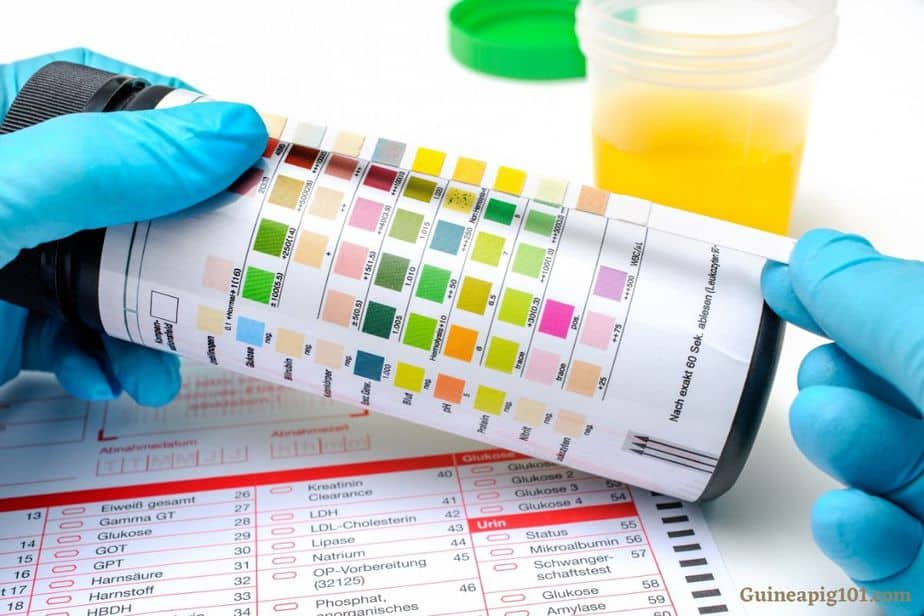
Guinea pigs suffering from a bladder infection or cystitis show a change in behavior. They show less physical activity and also loss in the diet.
It has been observed that they do not like physical contact too. The symptoms of bladder infection can be summarised, as mentioned below:
- Urine is excreted in large quantities.
- Guinea pig urinates after longer time duration than earlier
- Urine leakage.
- Cloudy or sludgy urine formation.
- The Colour of the urine is brownish red (except when the guinea pig has eaten any red vegetable like beetroot, red cabbage, or strawberries).
- Painful urination and even crying out of pain.
- Applying force while urination, showing unusual behavior.
- Different body language like hunching while urinating due to illness.
- Observe the guinea pig’s tail end if any yellow fur and skin is turning red due to scalding.
Also read: Red Urine In Guinea pigs
Guinea pig urine sludge
Guinea pig urinating cloudy, sandy, or sludgy urine is said to be suffering from hypercalciuria. That is due to excessive calcium deposits in the bladder.
An obvious question arises, what causes these calcium deposits in the bladder? Guinea pigs need very little calcium in their diet for healthy bones and ever-growing teeth.
Young guinea pigs require more calcium than adults. The excess of calcium absorbed from food is expelled through urine when it is filtered out by kidneys.
After the kidneys filter the calcium, it is passed into the bladder. The accumulation of calcium in the bladder causes the build-up of calcium on the bladder walls, which causes the sludgy or milky urine.
The sludge so formed when it moves through the urethra, guinea pig feels extreme pain, and the urethra swells up.
This sludgy urine and inflammation can lead to UTI. The steps to be taken to avoid such a situation are:
- Provide plenty of water to drink.
- Urinate completely to empty the bladder so that calcium is excreted out.
Guinea pig not peeing
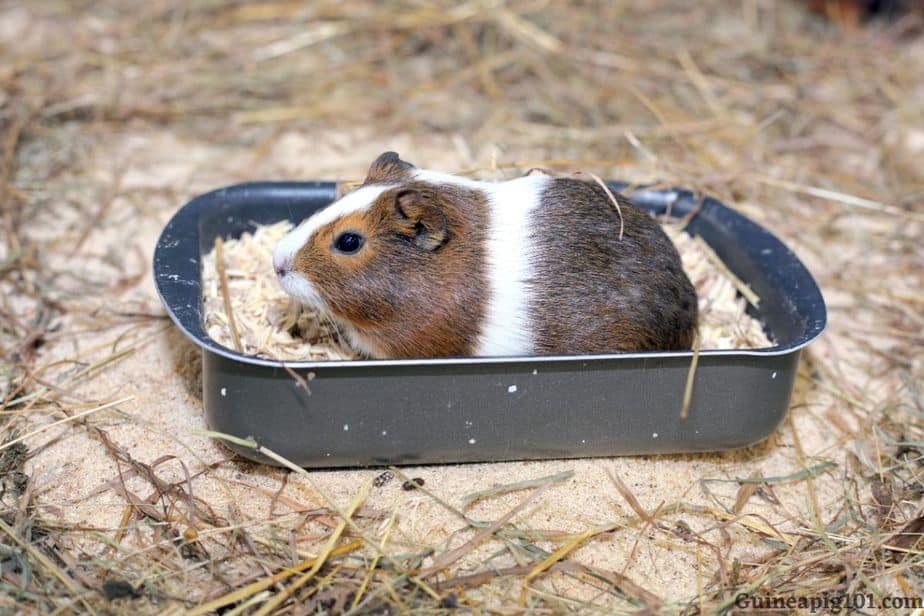
Guinea pig is not peeing or urinating in small quantities. That can be due to various reasons which are:
- Pain in the joints: Guinea pigs suffering due to pain in the joints are unable to get into a position to urinate comfortably. So, they are unable to excrete the urine entirely at a time. Any other pain can also cause improper urination.
- Litter pan is dirty: Guinea pigs are susceptible to hygienic conditions. If the litter pan is not clean, they will show reluctance to pee in it, or even if they pee, they will do it in a hurry. So they won’t be emptying their bladder.
- Fear: Guinea pigs under stress or anxiety due to anything also tend to hold back their urine in the bladder. Sometimes when either of the two guinea pigs staying together is more aggressive than the other, one may be afraid to pee in the litter pan. You need to be careful that the submissive guinea pig is behaving normally.
The healthy functioning of the urinary system is required for the overall good health of all organisms. So, if you observe any issues related to urination, try to solve it as soon as possible.
Bladder and kidney stone in guinea pig
Urolithiasis or kidney stone is caused due to the deposition of the calcium. The excess of calcium in the body gets deposited in the kidney and the bladder, which eventually turns into stones.
Once kidney and bladder stones are formed, they can block the passage of urine through the urethra. That is extremely painful for the guinea pig while urinating. That can result in secondary bacterial infection in the urinary tract.
Kidney stones formation is accelerated due to the low urination, lack of physical activity, improper diet, and others similar to those for cystitis. Lack of drinking water can also cause kidney and bladder stones.
Guinea pig bladder stones treatment
Guinea pigs having UTIs are often found to suffer due to sludgy urine and kidney stones. Your vet will help you to identify the presence of stones in the kidney and bladder. Radiology is used to examine the guinea pig having UTI.
Depending upon the severity of the kidney stones and blockage in the urethra, your vet will suggest medication. If the obstruction in the urethra is minimal, it can be flushed out with intravenous fluids help. Medication is provided to reduce the pain.
In some cases, when crystallization has blocked urethra, surgery may be done by your vet to clear the deposits. If possible, a vet may also use a catheter to clear the blockage and stones instead of surgery.
Kidney failure in guinea pigs
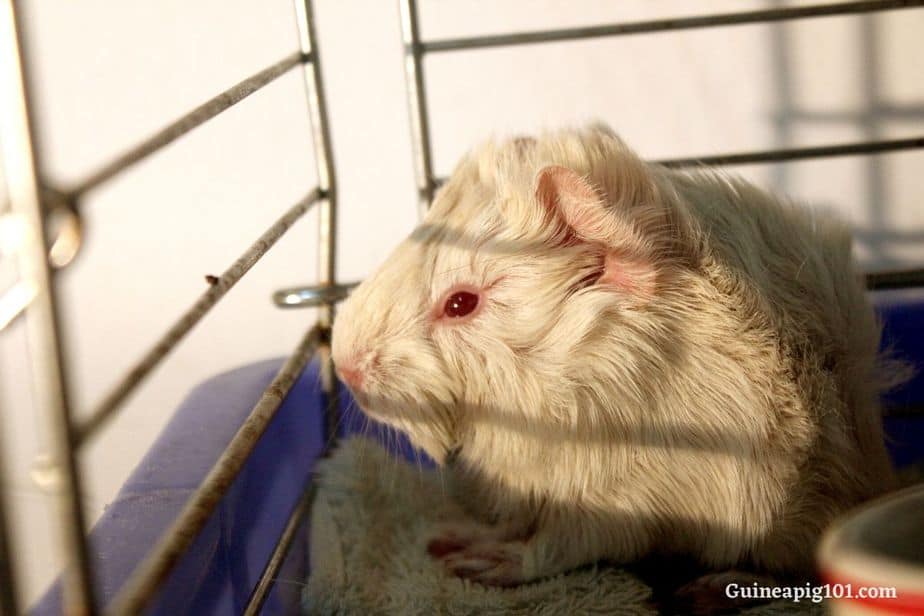
Kidney diseases cause significant pain and suffering to guinea pigs. That is more commonly found among older and female guinea pigs. Young guinea pigs are less susceptible to kidney disease.
Kidneys play an essential role in maintaining the balance of the water and other substances in the body. It filters waste and unwanted materials and excretes them in the form of urine.
Any disorder in the kidney will lead to the accumulation of toxic wastes in the body. The Guinea pig will fall sick due to kidney malfunctioning.
Kidney disease can be caused due to various reasons. UTI and cystitis are a common cause of kidney malfunctioning. Chronic kidney failures occur due to a few bacterial infections, for example, to E. Coli.
Other factors like diabetes, cancer, or any injury can cause kidney disorders, further leading to UTI development.
A kidney working correctly is essential to prevent any UTI. The kidney’s health should be observed.
Signs of kidney disease in guinea pigs
Kidney disease is observed with the following symptoms:
- Grinding of teeth
- Foul breath
- Dehydration and frequent request for drinking water
- Abdominal bloating
- Watery bowels
The symptoms of kidney disease are different from those of UTI.
Guinea pig kidney failure treatment
Guinea pig suffering due to kidney disease is at risk of losing life and needs immediate treatment.
Kidney disease caused due to bacterial cystitis occurring, again and again, can be treated with some alternative antibiotic.
Your veterinarian will prescribe medication and precautionary measures after a thorough examination.
Kidney disease can be alleviated with an increase in the intake of water and control in the diet. Older guinea pigs suffering from kidney disease are at higher risk as they cannot be cured.
How to treat a urinary tract infection in guinea pigs
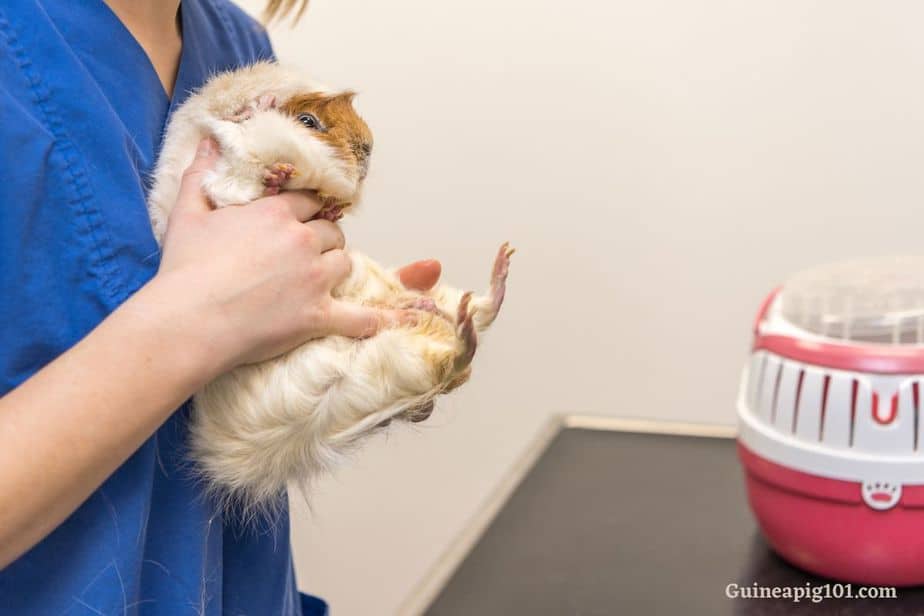
Treatment for UTI starts with the proper diagnosis of the infection. Once you observe any of the UTI symptoms in the guinea pig, take it to your vet for further examination.
Guinea pig’s urine is examined to confirm the presence of bacteria.
Microscopic observation of the urine helps to check blood or protein present in urine.
On the confirmation of UTI, antibiotic treatment is advised to control bacterial growth.
The urine sample is also sent for culture testing to identify the exact trait of the bacteria present.
The bacteria may die soon after the extraction; still, in a few instances, the culture testing gives useful information. That helps to treat the guinea pig with a specific antibiotic.
How long do urinary tract infection last in guinea pigs
The severity of infection determines the time needed for the treatment of UTI.
Secondary urinary tract infection lasts longer due to the root cause of sludgy urine and kidney stones.
Still, the minimum time required for the treatment under antibiotics may vary from 7-10 days.
On diagnosis of the exact bacterial trait, the further dosage of medicines is given.
How to prevent UTI in guinea pigs?
We all know prevention is better than cure. UTI occurring, again and again, is not suitable for the guinea pig.
That can be prevented by taking appropriate precautionary measures to change the lifestyle.
There are various causes of UTI that can be minimized by adhering to the following ideas:
Encourage to drink more water
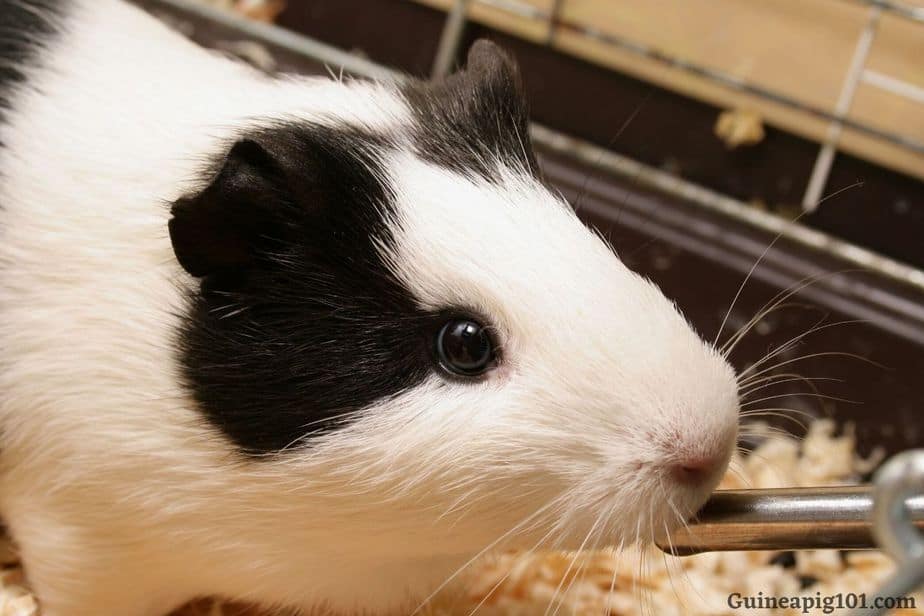
Increased water intake helps to get rid of calcium deposits from the kidney and bladder.
The urethra and the ureter also function correctly due to water. So, water intake is suggested as the best way to prevent UTI.
You need to do your homework to make guinea pigs drink lots of water.
Guinea pigs do not like to drink dirty water kept for a few days. So, you should change the water every day.
Offer the water in different containers like bowls or bottles. That makes the water drinking fun for guinea pigs. They are not much enticed to drink water from water bottles.
The vegetable diet of green leaves helps to increase the water level in the body.
A balanced and healthy diet
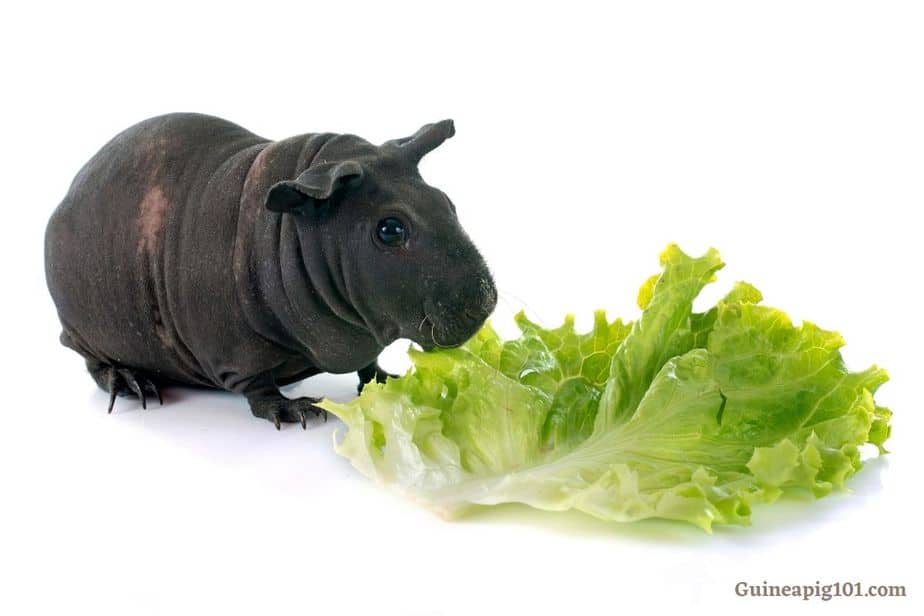
Diet is also an essential factor to manage urinary related diseases and infections. Veterinarians mostly recommend Timothy hay.
Fresh green leafy vegetables can be given as a supplement with timothy hay. The occasional treat of fruits also can be added to the diet.
Pellets and diet rich in calcium should be avoided. Pellets are usually derived from alfalfa hay, which has a high content of calcium. That will increase the risk of kidney stones and form sludgy urine.
Green vegetables may also contain calcium, but it has a high content of water too.
Exercise
Obesity and lack of physical activity will only aggravate the situation. Bodyweight under control is a simple way to manage many diseases, UTI being one of them.
The Guinea pig should be allowed to play outside and have fun. That will provide the necessary physical activity. Also, find some activity toys for them on which they run.
Also read: 25 Boredom buster ideas for guinea pigs
Well maintained enclosure
Dirty cage is the home for various bacteria that causes disease among guinea pigs. Guinea pigs staying in a clean environment are less susceptible to UTI.
Litter pan should be cleaned after every couple of hours. The cage can be cleaned as required or once in a week.
Remove the hay near the litter pan and also change the hay every day. Guinea pigs are reluctant to clear their bladder if the litter pan is dirty.
What color should a guinea pig urine be
Guinea pigs show a variety of changes in color shades of urine. There is nothing to worry about if you observe any modification unless it is regular and abnormal.
Guinea pigs pee can be yellow, beige, orange, brown, red, and pink. The change in color is observed due to a change in diet.
Only if the urine is sludgy, sandy, or milky, you should be concerned about its health-related to urinary disorder.
There might be traces of blood in the urine resulting in pinkish-red color, and then also you should visit your vet immediately.
Often, the red color of urine is mistaken as blood in urine, but that may not be the case. Guinea pig served with beetroot, or any red vegetable may form red pee.
Urinary tract infections can be fatal for guinea pigs; any delay in treatment will worsen the situation. It can be treated with antibiotics, but the root cause of UTI should be removed.
It is always better to take precautions against UTI by improving the diet, increasing water intake, cleaning the cage, and litter pan.
Source: MSD VET MANUAL, Sawneeanimalclinic, Urine sampling, ureteral obstruction in a pet guinea pig, Composition and characteristics of urinary calculi from guinea pigs, Development of the urinary system in guinea pig females, Cystitis, urolithiasis and cystic calculi in aging guinea pigs, STEROID DIABETES IN GUINEA PIGS
